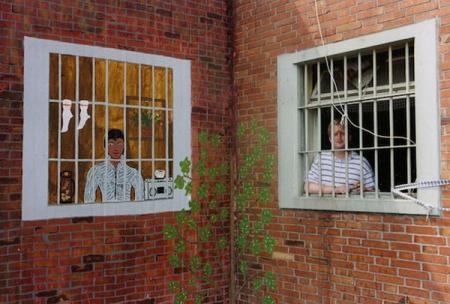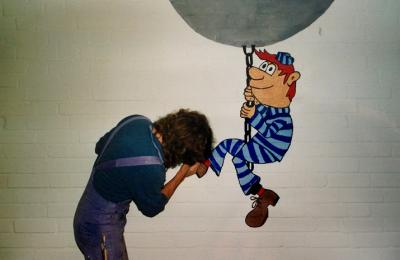
Thursday 20th January 2022 at Phyllis Court
10.45 repeated at 2.15pm
Angela Findlay
Years of working as an artist within the Criminal Justice System in England and Germany have given Angela unique insights into the destructive and costly cycle of crime, prisons and re-offending.

(Please click on the blue print above to continue reading)
In this thought-provoking talk she offers a deeper understanding of the minds, lives and challenges of offenders. With extraordinary slides of art projects and prisoner’s art, she demonstrates how within the process of creating art of any discipline, there are vital opportunities for offenders to confront their crimes and develop the key life skills so essential in leading a positive and productive life.

A frequent response to this talk has been “I had no idea!” and indeed it casts light onto areas of our society where the Arts not only are visual, decorative or commercial, but absolutely vital, hugely relevant and potentially life-changing.

This talk is moving, informative and very original. Interspersed with personal accounts of humorous or slightly horrifying situations, these talks have kept audiences across the country engrossed.
Angela Findlay is a professional artist, writer and freelance lecturer with a long career of teaching art in prisons in Germany and England. Her time ‘behind bars’ and later as Arts Coordinator of the London-based Koestler Arts, gave her many insights into the huge impact the arts can have in terms of rehabilitation. Though novel, her ideas were effective and in 2016 she was invited by the Ministry of Justice to support the case for the arts to be included in new, progressive programmes of rehabilitation and education. Brexit unfortunately reversed the direction of prison policy but art's role is still vital.
In the past decade Angela’s Anglo-German roots led her to research Germany’s largely unknown post-WW2 process of remembrance and the extraordinary culture of 'counter memorials' and site-specific artworks that emerged to express national shame and apology. With the current debates on statues and monuments, the ways Germany has tried to deal with its dark past is more relevant and inspiring than ever.
Angela has a BA(Hons) in Fine Art, a Diploma in Artistic Therapy (specialising in colour) and her paintings are widely exhibited both nationally and internationally. Her book on the above subjects will be published by Penguin in early 2022.
